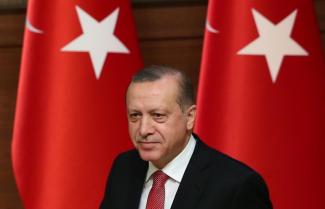Comment
Dangerous friend-or-foe thinking
 picture-alliance/abaca
Der türkische Staatspräsident Erdogan spaltet sein Land durch eine gefährliche Freund-Feind-Politik.
picture-alliance/abaca
Der türkische Staatspräsident Erdogan spaltet sein Land durch eine gefährliche Freund-Feind-Politik.
After their landslide election victory in 2002, the goal of Erdogan and his conservative Islamist party AKP was to get the country out of its deep economic crisis. At the same time, Erdogan began to transform Turkey step by step, rolling back the secularism of Mustafa Kemal Atatürk, the founder of the Turkish republic, and endorsing religiously conservative world views.
Trade unionists, left-wingers, Alevis or homosexuals all are a thorn in the side of the 62-year-old leader. When people protested against him in Gezi Park in the summer of 2013, he ordered a police crackdown.
Even Erdogan’s friends may soon become his enemies. The supporters of Fethullah Gülen, a Muslim leader, were long considered the AKP’s welcome helpers. In 1999, Gülen had gone into exile in the USA after a video emerged that instructed his followers to infiltrate the state apparatus. Unlike the AKP, the Gülen movement had competent supporters in government agencies. When the AKP rose to power, it therefore forged an alliance with these Islamist brethren.
Erdogan managed to rid himself of difficult opponents, including alleged conspirators, during his first years in office, and Gülenist state prosecutors helped him do so. When, however, disputes broke out between Gülen supporters and the AKP over power and positions, the president declared war on their “parallel structure”. Erdogan has since ordered the transfer or dismissal of thousands of state prosecutors and police officers who are blamed of being Gülenists.
In 15 July 2016, a failed coup attempt claimed the lives of over 200 people. The event played into Erdogan’s hands. He held the Gülen movement responsible. Erdogan declared a state of emergency and has ruled by decree ever since. Tens of thousands of people were arrested, accused of adhering to the Gülen movement. More than 120,000 people lost their jobs, regardless of whether the accusations were true or not.
Erdogan similarly changes his attitude towards the Kurdish minority as it suits him. In the course of a peace process with the Kurdish terrorist organisation PKK, the president relied on politicians from the pro-Kurdish HDP party as intermediaries, but he was really only interested in Kurdish votes. He abruptly stopped the peace process in July 2015 after the HDP won seats in parliament in an election. Their presence in parliament thwarted Erdogan’s plans to install a presidential system because the AKP lacked the necessary two-thirds majority. HDP legislators were detained in November 2016, charged with having spread terrorist PKK propaganda. More recently, Turkish prosecutors have demanded extremely long prison sentences for the HDP’s two top leaders: 142 years for Selahhatin Demirtas and 83 years for Figen Yüksekdag.
The consequences were – and are – fatal. The Turkish Army is once again waging war against the PKK in eastern Turkey. Lots of civilian lives have already been lost. Many young Kurds, who had seen the HDP as a ray of hope, have now joined the pied pipers of the PKK and the TAK, its urban youth organisation. Since December 2015 alone, the TAK has claimed responsibility for 11 terrorist attacks that have claimed the lives of over 100 people. An end to the terror is not in sight.
Erdogan boasts: “We will eliminate all terrorists.” In his rhetoric, the term includes the Gülenists. The Turkish lira is in freefall, however, and the president now even considers terrorists people who have dollar bills in their wallets. According to him, dark forces, foreign intelligence services and the “interest-rate lobby” are behind every problem. Erdogan will not consider for one moment that he himself might be to blame, at least in part, for some of the problems. The demagogue sees anyone who thinks or says so an enemy – and is happy to hound those persons.
Timur Tinç is a member of the editorial team of Frankfurter Rundschau, a daily newspaper.
t.tinc@fr.de

